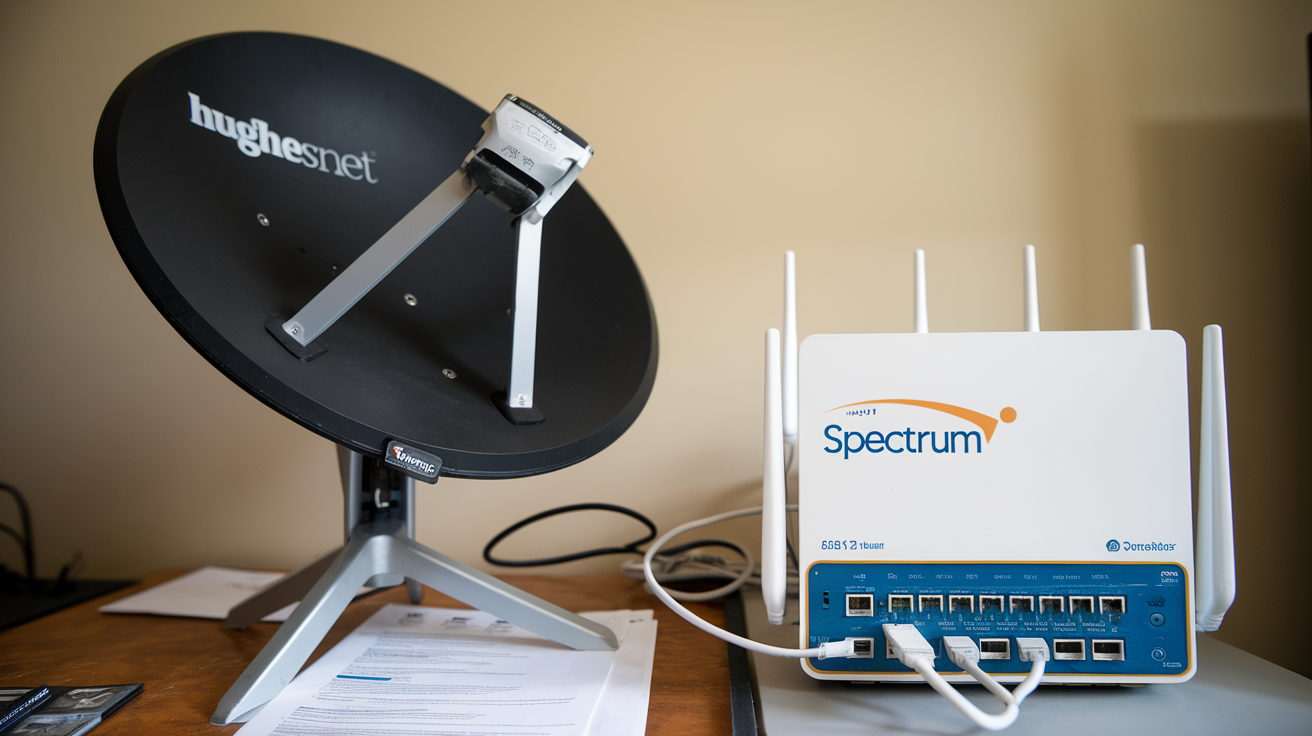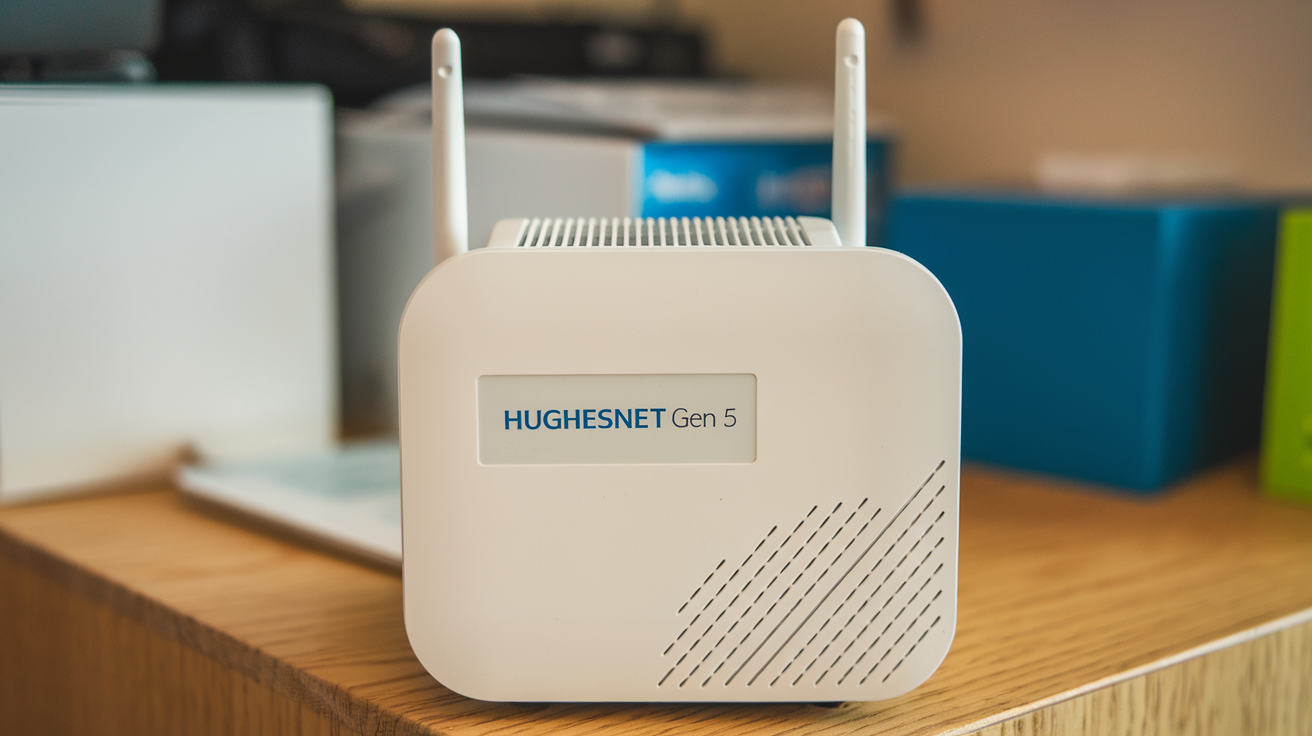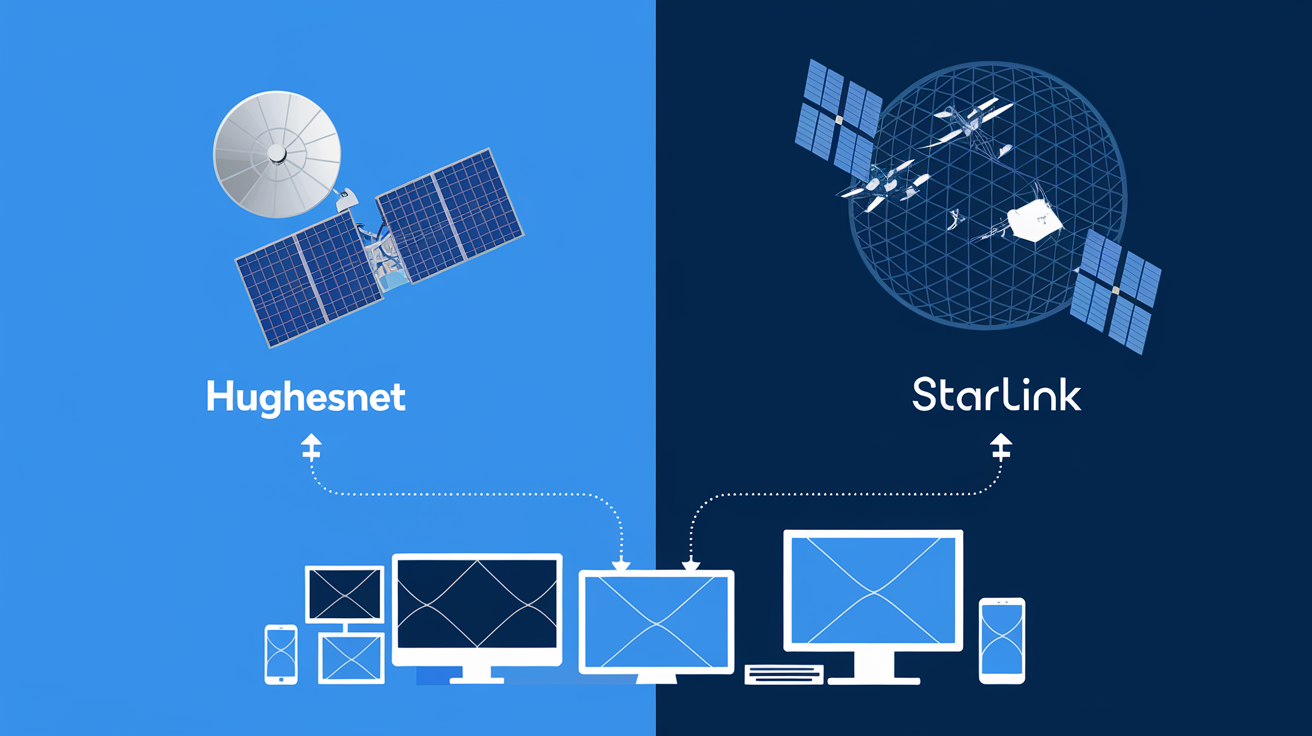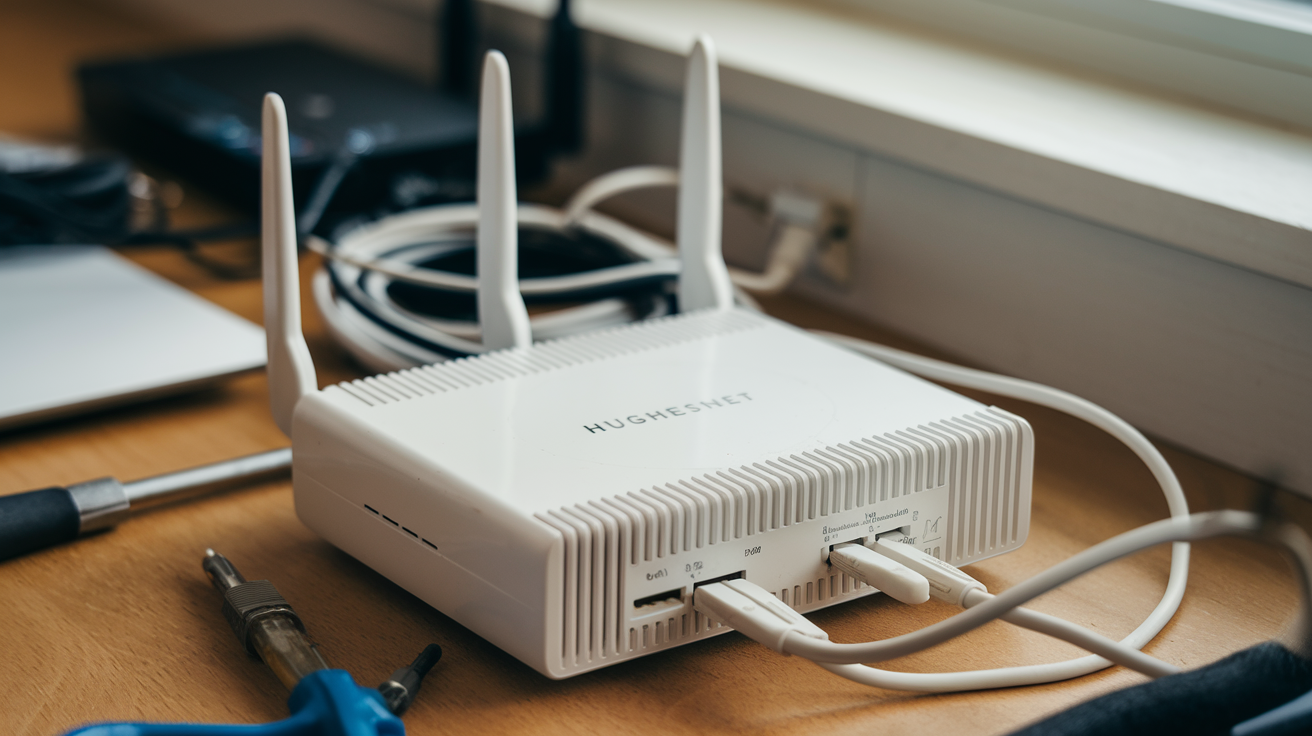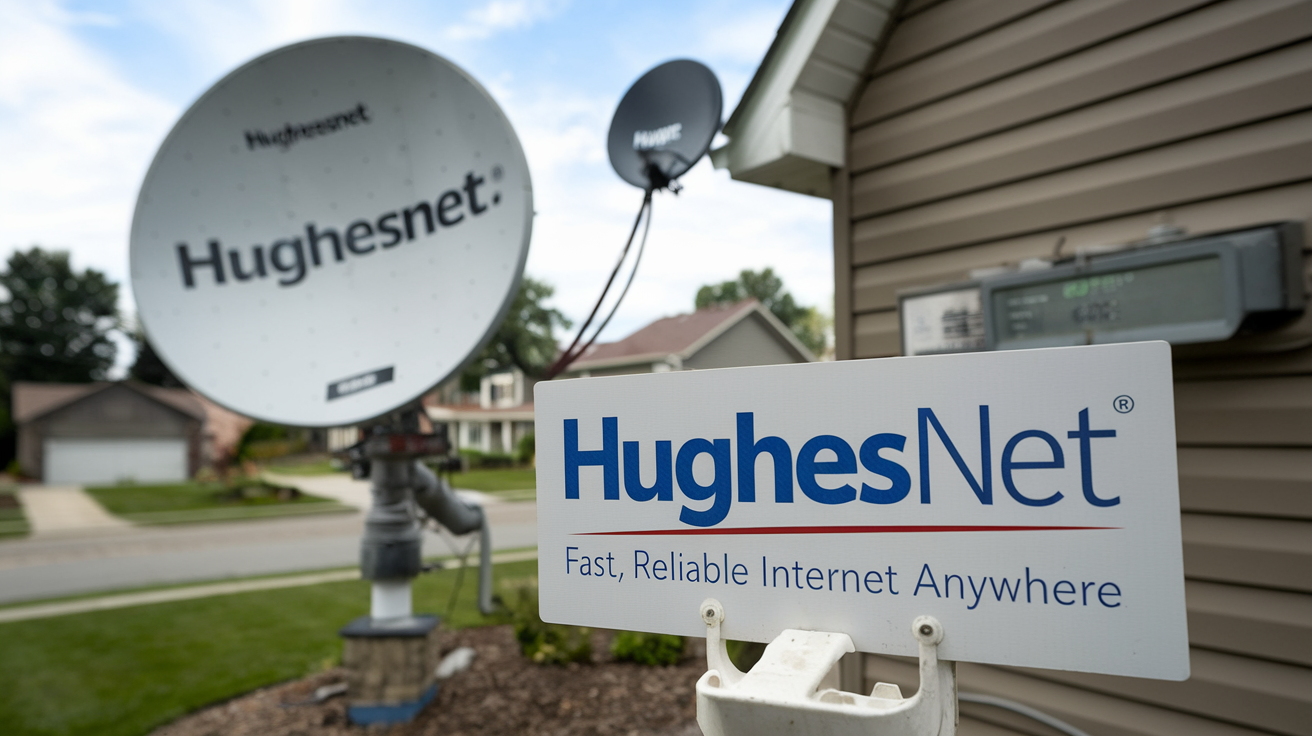
For people living in places with few internet choices, satellite internet is a dependable option. HughesNet plans to deliver reliable service throughout the United States, including hard-to-reach areas. In this guide, we will look into what HughesNet offers, its pricing, and how it performs. We will also compare it to other internet providers. This way, you can make a smart choice for your home internet needs.
Understanding HughesNet Satellite Internet
HughesNet is a well-known satellite internet provider. It has a wide coverage area across the US. Unlike cable or DSL connections, which need physical wires, HughesNet sends internet service straight from satellites in space.
This method makes HughesNet a good choice for people living in rural places where there are few internet options. Even though satellite internet is usually slower than fiber or cable, HughesNet has worked hard to improve its services. This makes it a good option for many users.
The Basics of Satellite Internet Technology
Satellite internet, like HughesNet, uses a group of satellites orbiting the Earth to send and get data. When you connect to the internet, your request goes from your device to a satellite dish on your property. This dish sends the signal to a satellite in space. The satellite then sends the information to a ground station, known as a Network Operations Center, and back to your home via satellite again.
This method involves longer distances compared to other internet options, which causes higher latency. Latency, measured in milliseconds, is the wait time between sending a request and getting a response. Higher latency can impact activities that need quick responses, like online gaming, where real-time interaction is very important.
Although satellite internet used to struggle with high latency, new technology, such as HughesNet's Fusion plans, tries to fix this problem. It combines wireless internet technology to give a faster and better experience.
HughesNet's Position in the US Market
The US internet market is very varied. There are many technologies and providers for different areas. In places with strong infrastructure, people often choose cable internet from providers like Xfinity and Spectrum. DSL internet, which uses phone lines, is also available in some parts. However, many rural areas do not have these options, leading to a need for different internet services.
This is where satellite internet comes in. Providers like HughesNet help connect communities that do not have good internet options. By 2025, internet service stats show that 73% of rural Americans can get high-speed internet at home. This is much lower than the 86% of people in suburban areas who have access. This difference shows how important satellite internet is in decreasing the digital gap.
HughesNet has a wide coverage area. They provide home internet plans that are always changing. This has made HughesNet a key player in the satellite internet field. They give a reliable internet service to those who lack traditional options.
Evaluating HughesNet Plans
Choosing the right internet plan is important. You need to think about what you need and how much you can spend. HughesNet has different plans that fit different needs. Each plan comes with its own data limits, speeds, and pricing. You should know these details to pick the plan that works for your home.
If you mostly browse the web, play online gaming, or need the internet for remote work, HughesNet wants to offer you a good choice. Let’s take a look at their plans to find the one that fits you best.
Overview of Available Plans and Pricing
HughesNet offers three primary internet plans: Select, Elite, and Fusion. Each plan boasts unlimited data but with varying priority data caps. Once you exceed your priority data limit, your internet speed slows down, but you won't incur overage fees. This differs from traditional data caps, which often lead to additional charges or complete service interruptions.
The most affordable option, the Select plan, starts at $49.99 per month (increasing to $75 after the first year), offering download speeds up to 50 Mbps and a 100 GB data cap. For higher speeds and a larger data cap, the Elite and Fusion plans, priced at $64.99 and $94.99 per month, respectively (increasing to $90 and $120 after the first year) provide download speeds of up to 100 Mbps and 200 GB data cap. For users seeking lower latency, crucial for activities like online gaming, the Fusion plan emerges as the preferred choice. This distinction highlights HughesNet’s efforts to cater to users with demanding internet needs.
Here’s a summarized table of HughesNet internet plans:
|
Plan Name |
Price (First Year) |
Download Speed |
Data Cap |
|---|---|---|---|
|
Select |
$49.99 |
Up to 50 Mbps |
100 GB |
|
Elite |
$64.99 |
Up to 100 Mbps |
200 GB |
|
Fusion |
$94.99 |
Up to 100 Mbps |
200 GB |
Note: Prices increase after the first year.
Comparing Data Limits Across Plans
Understanding HughesNet's data limits is important when choosing a plan. All HughesNet plans come with unlimited data, but each one has a certain amount of priority data. This priority data is the monthly data you can use at full speed. For example, with the Elite HughesNet plan that has a 200 GB data cap, you get up to 200 GB of data at the fastest speed possible.
When you use all your priority data, HughesNet does not stop your internet. Your internet speed will slow down a lot. This slowdown can make things like streaming and gaming harder, but you can still do basic internet tasks. HughesNet also has a bonus zone feature. This gives you an extra 50 GB of data at full speed from 2 am to 5 am. You can use this time to do data-heavy tasks without bothering your daytime internet speed.
The Fusion plan has the same data cap as the Elite plan, but it uses a mix of satellite internet and fixed wireless technology. This combination gives it lower latency. Lower latency is great for online gaming and other activities that need a quick response time.
The True Cost of HughesNet Internet
While HughesNet’s monthly prices for internet plans look good, it's important to think about extra costs that add to the total. Knowing these costs ahead of time can help you plan your budget better and avoid surprises when you get the bill.
Besides the monthly plan fee, things like equipment rentals, installation fees, and possible early termination charges can raise the total cost of HughesNet Internet. Let’s look at these extra costs to give you a better idea of the actual money you need to invest.
Equipment and Installation Fees
HughesNet internet needs special equipment to work well. This usually means you need a satellite dish and a modem/router to connect. While some internet providers let you use your gear, HughesNet requires you to use their provided devices. You can either lease the equipment each month or buy it outright.
When you lease, you’ll add a monthly fee to your bill. This fee ranges from $14.99 to $19.99 based on your plan. If you decide to buy the equipment, it costs more upfront, between $299.99 and $449.99. If you choose to lease, make sure you know the lease terms and any fees if you end the lease early.
You will also pay a one-time fee for installing the satellite dish and connecting your devices. This installation cost is usually $200, but it might be waived or reduced if you buy your equipment.
Understanding the Fine Print: Additional Fees and Service Details
Before you choose an internet service, it's important to read the fine print and know about any extra fees or terms in the agreement. This is true for HughesNet satellite internet as well. Knowing these details helps you have a clear and smooth experience as a customer.
One important thing to pay attention to is how HughesNet defines "unlimited data." They do not have strict limits on data, but if you use more than your plan's priority data limit, your internet speed will drop. You can still use the internet, but activities like streaming movies or downloading files will be slower.
Also, be aware of HughesNet's early termination fees. They require a 24-month contract for all plans. If you choose to cancel your service before the contract ends, you might have to pay a high fee. This fee changes based on how much time is left in your contract, with higher fees for cancellations that happen soon after you start your service.
Performance and Reliability
When looking at an internet service provider, it’s important to do more than just check their plans and pricing. Their performance and reliability are key. These factors affect things like how well you can stream videos or play online games.
HughesNet understands that satellite internet isn’t the best choice for constant video streaming or gaming on consoles because of data limits. Let’s take a look at what speed you can realistically expect and how well HughesNet does with uptime and service reliability.
Speeds: What to Expect
HughesNet gives download speeds up to 100 Mbps with its Elite and Fusion plans. This is a big upgrade from what they offered before. Now, they are closer to the speeds of some cable and DSL providers. However, you should know that your real speeds can be different from what they advertise.
Factors like network congestion during busy times, where you live, and even the weather can all change the speed you get. HughesNet works hard to keep speeds high, but these outside factors can sometimes affect performance.
When you look at the download speeds of different HughesNet plans, you’ll see a big jump from the basic Select plan at up to 50 Mbps to the Elite and Fusion plans at up to 100 Mbps. This speed difference helps with things like downloading large files or streaming HD content, which makes the Elite and Fusion plans better for heavy data users.
It’s important to note that upload speeds, which are very important for online gaming or video calls, are usually lower than download speeds with HughesNet, like with most internet providers.
Reliability: Uptime and Customer Feedback
The uptime of an internet service provider, which is how often the service works and is available, is very important for overall customer satisfaction. HughesNet aims to keep a high uptime. But sometimes, outside factors can interrupt the service.
HughesNet uses satellite technology, which makes it more sensitive to weather changes compared to regular internet connections. Heavy rain, snow, or clouds can break the signal for a while. This can cause slower speeds or short outages. Although HughesNet works hard to lessen these effects, it is important to understand how weather can affect satellite internet.
Customer opinions about HughesNet's reliability vary. Some users say they have steady uptime and face only a few service interruptions. Others, however, deal with occasional outages or slower speeds, especially during busy times or bad weather. Looking at reviews and forums can give you helpful details from other users near you.
HughesNet Compared to Other Providers
When picking an internet provider, it is important to look at the different choices in your area. HughesNet is a well-known name in satellite internet, but you should check how it compares to other technologies and providers.
Comparing these options helps you see the benefits. For example, DSL or cable internet often offers faster speeds than satellite internet, but satellite has wider coverage. A careful comparison will help you choose the service that fits your needs the best.
Satellite vs. DSL vs. Cable: A Comprehensive Comparison
Choosing between satellite internet, DSL, and cable internet means looking at several things. You need to consider availability, speed, pricing, and data limits. Cable internet is often preferred for its high speeds and reliability. It uses a wired network, making it widely available in cities and suburbs. DSL uses phone lines and usually has lower speeds than cable, but it can be a good broadband internet option where cable is not available.
Satellite internet is a good choice for rural areas or places that lack access to cable or DSL. HughesNet is a popular satellite internet provider. They send internet service from satellites straight to people’s homes, allowing service in a broader area than with cable or DSL. However, satellite internet often has higher latency because the signal travels to and from space. This can affect real-time activities like online gaming.
Overall, cable internet is usually the best choice when it’s available. It provides a good mix of speed and cost. DSL is a reliable option where cable cannot reach, and satellite internet connects those who live where traditional options don’t.
HughesNet and Viasat: Head-to-Head
HughesNet and Viasat are the two main players in satellite internet. They both provide nationwide coverage and focus on rural areas that large internet companies often ignore. While they both use satellite technology, some differences in their plans, pricing, and performance are worth noting.
Viasat usually offers faster speeds than HughesNet. They can reach up to 150 Mbps for downloads. In comparison, HughesNet's top plans offer a maximum of 100 Mbps. However, HughesNet tends to be cheaper. Their basic plans start at lower rates than Viasat's.
The data limits for the two companies are different as well. Viasat usually offers higher data limits, which means you can use more data before your speed slows down. On the flip side, HughesNet has something called the Bonus Zone. This feature gives users 50 GB of extra data during off-peak hours. This is helpful for nighttime downloads and streaming, as it does not count against your daytime data. Choosing between HughesNet and Viasat comes down to what you need and prefer.
Enhancements and Features
HughesNet offers more than just basic internet service. They provide extra features to make the user experience better and add more value. These features help make satellite internet more appealing and meet the needs of different customers.
With built-in Wi-Fi and optional services, HughesNet aims to give a complete internet and communication solution. Let’s explore these features to see how they improve the entire HughesNet experience.
Built-in Wi-Fi and Other Features
HughesNet knows how important good internet is for today's homes. They provide a modem/router unit that has built-in Wi-Fi. This means you do not need a separate Wi-Fi router. It makes setup easy and allows you to connect many devices wirelessly.
HughesNet Voice is another feature to think about, especially for those who need a dependable home phone. This service uses your internet connection to make and receive calls. It is a cheaper option than traditional landlines. HughesNet Voice comes with your internet service, which makes your monthly bill easier to manage and keeps your communication in one place.
Keep in mind that using VoIP will use up data from your monthly internet allowance. Be sure that your HughesNet internet plan has enough data to support both your internet usage and voice calling needs.
Add-On Services: VOIP and More
HughesNet Voice is a VoIP service. It lets users make unlimited local and long-distance phone calls within the US and Canada. This service is a good option for those who often make long-distance calls instead of using traditional landlines. It usually comes with features like caller ID, voicemail, and call waiting, so you will have the key-calling tools you need.
One important thing to remember about VoIP like HughesNet Voice is it depends on a strong internet connection. If your internet service goes down, you can’t make or receive phone calls. It is crucial to think about this if you live in an area where internet outages happen often or if you need the phone a lot for work or to stay in touch.
Even though HughesNet does not provide many extra services like some other internet providers, they focus on giving reliable internet and basic VoIP phone options for folks in rural or underserved areas.
User Experience and Support
A good user experience goes beyond just the technical parts of internet service. Support, especially during setup or when problems come up, is very important for keeping customers happy.
HughesNet aims to offer easy ways for customers to get help with questions or tech issues. Even though their customer service ratings are usually not as high as other companies, HughesNet is working to make their support better. Let's take a look at the support options available for HughesNet customers.
Navigating HughesNet Customer Service
Accessing good customer service is very important when you have problems or questions about your internet service. HughesNet offers many ways for customers to get support. You can contact them by phone, email, or use their online resources.
Using phone support lets you talk directly to a HughesNet representative. You can explain your issue and get help right away. However, wait times may change based on how many calls they have. You can also use email support for issues that are not urgent. This way, you can write down your concerns and get a reply within a set time.
HughesNet's website has a full support section. It includes FAQs, guides to fix problems and how-to videos. This is a helpful self-help option. It helps you solve common issues on your own without waiting for customer service.
Tips for Optimizing Your HughesNet Experience
Optimizing your HughesNet experience helps you get the most from your internet plan. It also lets you have a smooth online experience. A big part of this is knowing how much data you use and using the Bonus Zone feature well. By tracking your data usage, you can avoid going over your plan's priority data limit. When you do this, you can avoid slower speeds.
HughesNet gives you tools in your account dashboard and the mobile app. These tools help you keep an eye on your data usage. They show you when you use the most data. This information lets you change how you use the internet. Use HughesNet’s Bonus Zone, which offers 50 GB of bonus data from 2 am to 5 am. This is a great time to schedule big downloads, updates, or backups. Using off-peak hours like this helps you save your daytime data for regular use.
Make sure to check your equipment often. Pay special attention to the satellite dish. Look for problems like tree branches or snow blocking it. These could weaken your signal and slow down your internet. Keeping a clear line of sight between your dish and the sky is important for the best signal and performance.
Decision-Making Tools
Choosing the right HughesNet plan requires you to think about your needs, usage, and budget. HughesNet wants to give everyone an internet solution, even in remote areas. However, it is important to consider if it fits your situation.
Below, we will look at some factors to help you see if HughesNet is right for you and how to get the most value from your internet package.
Is HughesNet Right for You? Factors to Consider
Choosing if HughesNet is a good fit for you relies on several things. These include where you live, how you use the internet, and your budget. For people in rural areas without cable or DSL options, satellite internet like HughesNet is usually the best choice. HughesNet covers a large area, making it available for many in the US. This makes it a helpful option for communities that may not have other internet options.
Look at how your household uses the internet. This will help you see if HughesNet’s plans are right for you. If you mainly use the internet for browsing, checking emails, and light streaming, HughesNet could work well for you. But if you often play online games or stream in 4K, think about the data limits in various HughesNet plans. This way, you can have a good online experience.
Check the total cost of a HughesNet plan. This includes equipment fees, installation charges, and monthly payments. Compare these costs to other internet options in your area. This will help you see if HughesNet offers good value when matched with other options like DSL or local fixed wireless services.
How to Maximize Value for Your Internet Plan
Once you pick a HughesNet plan, you need to manage your data well to get the most out of it. This means using its features and keeping an eye on any deals or promotions. Check your data usage often to stay within your plan’s priority data limit. This helps you avoid slow internet speeds.
Use HughesNet’s tools on their website or mobile app to see how much data you use. This way, you can change your habits if needed. This approach helps you maximize your plan’s high-speed data. If you need a home phone, think about bundling HughesNet Voice with your internet plan.
Bundling can save you money compared to paying for each service separately. This lowers your monthly bill. Also, keep an eye out for any special deals or discounts from HughesNet. These offers can give you good savings on things like equipment, installation, or your monthly service fees, especially if you are a new customer.
The Future of HughesNet and Satellite Internet
The internet technology is always changing. These changes affect how fast the internet is, how easy it is to get, and how much it costs. Satellite internet has some delays that can be challenging. However, it keeps improving to give users a better experience.
HughesNet shows its dedication to new ideas in satellite internet. It recently launched the Jupiter 3 satellite. This new satellite greatly increases capacity and allows for faster speeds. Now, the question is, what will the future look like for HughesNet and satellite internet?
Upcoming Technological Advancements
The future of HughesNet and satellite internet depends on new technologies that can fix current problems and make service better. One area being researched is high-throughput satellites (HTS) and better ground systems.
HTS uses focused spot beams. This means it can provide faster speeds and more bandwidth than regular wide-beam satellites. As a result, users can enjoy higher data limits, quicker downloads, and a smoother online experience overall. Reducing latency is very important so that satellite internet can compete well with other internet options.
There are still challenges because signals travel long distances to and from space. However, new technologies like laser-based communication systems could change this. Laser systems can transfer data much faster and reduce latency compared to older radio methods. This could completely change how satellite internet works.
The Role of Satellite Internet in Bridging the Digital Divide
The digital divide is the gap between people who have access to reliable high-speed internet and those who do not. This issue is a big problem, especially for rural communities and underserved groups. It limits their chances for better education, healthcare, and economic growth.
Satellite internet is important for closing this gap. It offers internet access to remote areas that cannot connect through regular methods. HughesNet is a key player in this effort, with a wide coverage area and a focus on helping rural communities.
As technology improves, satellite internet is getting better too. It now offers faster speeds, lower latency, and more affordable plans. This will help people in distant areas connect more easily. It promotes digital inclusion and helps create a fairer digital world for everyone.
Conclusion
In conclusion, HughesNet has various satellite internet plans that can meet different needs. They offer clear pricing and dependable service. It's important to know the real costs, what performance to expect, and how they compare to other providers. HughesNet also includes features like built-in Wi-Fi and great customer support for a smooth user experience. When deciding if HughesNet is the right choice for you, think about things like data limits, how well it works in bad weather, and any long-term contracts. As satellite internet technology keeps improving, HughesNet works hard to help everyone stay connected. Make a wise choice for your internet needs and stay in touch with HughesNet.
Call (888) 797-3141 and Start Your Hughesnet Internet Service Now!
